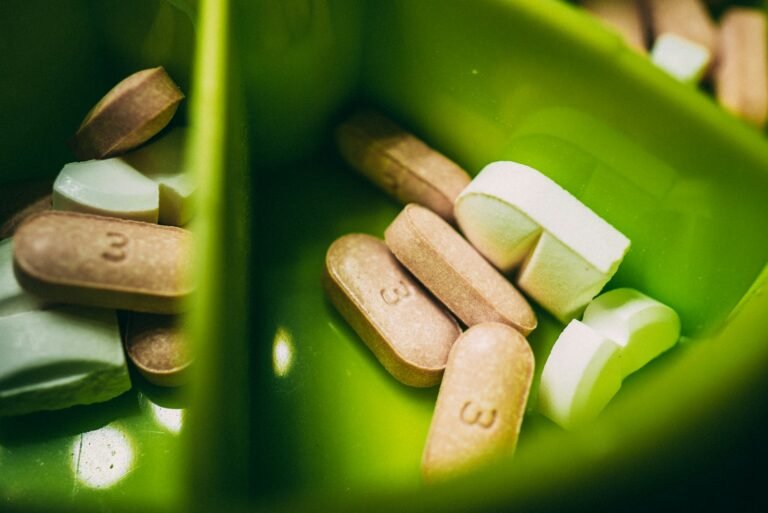How to Improve Gut Health with Probiotics
Over the past few years, the significance of gut health has gained considerable attention, and probiotics have emerged as a powerful tool in promoting digestive wellness. By incorporating probiotics into your daily routine, you can support a balanced gut microbiome, which is crucial for overall health. This guide will walk you through effective ways to enhance your gut health through probiotics, empowering you to make informed choices for your well-being.
Key Takeaways:
- Incorporate a variety of probiotic-rich foods such as yogurt, kefir, sauerkraut, and kimchi into your diet to enhance gut diversity.
- Consider taking probiotic supplements after consulting with a healthcare professional, particularly if you have specific health concerns.
- Maintain a healthy lifestyle by balancing your diet with fiber-rich foods to support the growth of beneficial gut bacteria.
- Limit the intake of processed foods and sugars, as they can negatively impact gut health and the balance of gut microbiota.
- Stay hydrated to promote optimal digestive function and help probiotics thrive in the gut environment.
The Gut Microbiome: A Complex Ecosystem
The gut microbiome consists of trillions of microorganisms, including bacteria, viruses, fungi, and even archaea. This complex ecosystem plays a significant role in your overall health, influencing everything from digestion to immune function. Each person’s microbiome is unique, shaped by factors like your diet, environment, age, and even genetics. A balanced microbiome is necessary for optimal digestion and nutrient absorption, so understanding this intricate system can help you make informed decisions to support your gut health.
Within this ecosystem, bacteria are fundamental players. They assist in breaking down food substances that your body cannot digest on its own, such as fibers found in fruits and vegetables. This process produces short-chain fatty acids (SCFAs) that are vital for maintaining the health of your intestinal lining and regulating your immune system. By thriving in your gut, beneficial bacteria also combat pathogenic organisms, lowering the risk of infections and gastrointestinal disorders. The interplay between these diverse microbial populations is necessary for maintaining digestive balance and promoting well-being.
The Role of Bacteria in Digestive Health
Bacteria in your gut serve a multitude of functions that directly impact your digestive health. They help ferment undigested carbohydrates, turning them into energy and making necessary nutrients more bioavailable. The presence of helpful bacterial strains, such as Lactobacillus and Bifidobacterium, assists with the synthesis of vitamins, particularly vitamin K and certain B vitamins. These actions collectively contribute to a more efficient digestive process and improved nutrient absorption, which are crucial for maintaining energy levels and overall health.
Moreover, the gut bacteria establish a protective barrier against harmful pathogens. They compete for resources and have the ability to produce antimicrobial compounds that inhibit the growth of detrimental bacteria and fungi. This not only helps in preventing gastrointestinal infections but also supports your immune system by influencing the body’s inflammatory responses. A healthy balance of bacteria fosters a harmonious digestive tract, reducing the likelihood of conditions like irritable bowel syndrome (IBS) and inflammatory bowel disease (IBD).
Factors That Disrupt Gut Microbiota
Several factors can disrupt the delicate balance of your gut microbiota, leading to dysbiosis and associated health issues. Antibiotics, while effective in combating infections, often indiscriminately kill both harmful and beneficial bacteria, significantly altering your microbiome. Other factors include a diet high in processed foods and sugars, which can favor pathogenic bacterial overgrowth. Stress and lack of sleep can also negatively affect the composition and diversity of gut bacteria, making them less resilient in the face of fluctuations in diet and lifestyle.
Additionally, environmental influences such as pollution and exposure to certain chemicals can further compromise the integrity of your gut microbiome. A sedentary lifestyle has been linked to reduced microbial diversity, as the lack of physical activity can decrease the abundance of beneficial bacteria. Prolonged periods of poor dietary habits and lifestyle factors may ultimately lead to a range of gut-related issues, including gas, bloating, and digestive discomfort. Any disruption calls for immediate attention to restore balance.
- Antibiotic use can alter microbial composition rapidly.
- Low-fiber diets impede the growth of beneficial bacteria.
- Chronic stress negatively impacts microbiota diversity.
- Exposure to environmental toxins can influence gut health.
- Inactive lifestyles can drive down commensal bacteria levels.
Maintaining a balanced gut microbiota requires diligence in adopting habits that bolster your microbiome’s health. Beneficial bacteria thrive on a diverse range of nutrients found in high-fiber foods, while avoiding excessive sugar and processed ingredients helps to keep detrimental organisms at bay. Any significant changes in your routine should involve gradual adjustments, allowing your gut to adapt and flourish in a healthier environment.
- A continuous intake of fermented foods reinforces beneficial bacteria.
- Hydration supports digestive health and the maintenance of gut mucus.
- Tailoring your dietary choices can optimize microbiome diversity.
- Mindful practices reduce stress and support gut function.
- Consistent exercise enhances overall gut health over time.
Unpacking Probiotics: What You Need to Know
Defining Probiotics: Strains and Benefits
Probiotics are live microorganisms that confer health benefits when consumed in adequate amounts. These beneficial bacteria come in various strains, each with specific roles and effects on the gut. Lactobacillus and Bifidobacterium are among the most well-studied strains, frequently found in fermented foods and widely known for their ability to help alleviate digestive issues such as diarrhea and irritable bowel syndrome. You might also encounter less common strains like Saccharomyces boulardii, a yeast-based probiotic that has shown promise in promoting gut health by reducing symptoms of antibiotic-associated diarrhea.
The benefits of probiotics extend beyond digestive health. Some strains have been linked to enhanced immune function, mental health support, and even weight management. For instance, Lactobacillus rhamnosus GG is noted for its potential role in preventing respiratory infections, while Bifidobacterium longum has been associated with stress reduction. By choosing a variety of probiotic strains, you can tap into a broader spectrum of health benefits for your gut and overall well-being.
Probiotic Sources: Food vs. Supplements
Your approach to incorporating probiotics can take two primary forms—food or supplements. Foods fermented with live cultures, such as yogurt, kefir, sauerkraut, and kombucha, are not only delicious but provide a natural way to add probiotics to your diet. Fermented foods often come packed with additional nutrients and prebiotics, which can further support the growth of beneficial bacteria in your gut. Engaging with these foods can also introduce variety into your meals, making the experience more enjoyable.
On the other hand, probiotic supplements offer a concentrated dose of specific strains, making them a convenient option for those seeking targeted health outcomes. Available in various forms—capsules, powders, or liquids—supplements can deliver higher concentrations of certain beneficial bacteria. This can be particularly useful if you have specific gut health goals or if you struggle to consume enough probiotic-rich foods consistently. However, the type of probiotic you choose should be based on your individual health needs, lifestyle, and the specific strains you’re interested in.
Both food sources and supplements play valuable roles in improving gut health. Fermented foods, often rich in diverse strains, provide a holistic approach to gut wellness through naturally occurring cultures and vitamins. Supplements, on the other hand, bring precision, allowing you to utilize specific strains for tailored benefits, especially in instances such as post-antibiotic recovery or digestive health issues. Ultimately, finding the right balance between food sources and supplements can help you establish a robust approach to enhancing your gut health.
Crafting Your Gut Health Strategy
Identifying Your Gut Health Goals
Establishing clear objectives for your gut health can significantly enhance your journey toward improved well-being. Start by assessing your current gut health—consider symptoms such as bloating, irregular bowel movements, or food intolerances. You may aim to reduce discomfort, improve digestion, or increase overall energy levels. Personalized goals, such as enhancing mood through gut-brain connections or supporting your immune system, can further guide your approach. For instance, if you often experience digestive troubles, a goal might focus on incorporating specific probiotic strains that target those issues, such as Lactobacillus or Bifidobacterium, known for alleviating digestive discomfort.
Tailoring Probiotic Intake to Your Needs
Your probiotic intake should reflect your unique health circumstances and goals. With a diverse array of probiotic strains available, selecting the right one can make a significant impact. For example, if you’re dealing with antibiotic-induced diarrhea, probiotics containing Saccharomyces boulardii can be particularly beneficial. Conversely, if your focus is on enhancing your immune function, look for multi-strain formulas that include Lactobacillus rhamnosus GG, which has been shown to bolster immune responses. Monitoring your body’s reactions after introducing specific probiotics will also help you fine-tune your strategy over time.
Additionally, tracking changes in your digestive health and related symptoms can offer insights into whether a particular probiotic is effective for you. Consider maintaining a journal where you note your dietary habits, probiotic intake, and any changes in how you feel. This method not only provides clarity but also helps you identify which strains work best for your individual needs. By customizing your probiotic intake based on these observations, you can optimize your gut health and ultimately enhance your overall quality of life.
The Synergy of Diet and Probiotics
Incorporating probiotics into your daily routine is only one part of achieving optimal gut health. The foods you consume alongside probiotic-rich options can significantly enhance their effectiveness. By focusing on a balanced diet rich in specific nutrients, you can create a thriving environment for your probiotics. A diverse and nutrient-dense diet ensures that your gut microbiome has the necessary resources to flourish. For instance, fermented foods not only provide imperative probiotics but are often rich in vitamins, minerals, and bioactive compounds that work synergistically to improve digestion and overall wellness.
Foods That Support Probiotic Efficacy
Fruits and vegetables, particularly those high in fiber, act as natural companions to probiotics. Foods like apples, bananas, and artichokes, for instance, not only supply vitamins and antioxidants but also create a favorable environment for probiotics to thrive. Whole grains, legumes, and nuts are additional options that can bolster your gut health. Specific varieties of oats or barley contain beta-glucans, which have been shown to enhance the growth and activity of beneficial gut bacteria. Consistently opting for these types of foods alongside your probiotics can lead to a robust microbiome and improved digestive health.
The Importance of Prebiotics
Prebiotics serve as the fuel for probiotics, allowing them to flourish and do their job effectively. By incorporating prebiotic foods into your diet, you’re imperatively providing a welcoming habitat for the beneficial bacteria introduced through probiotics. Common sources of prebiotics include onions, garlic, leeks, asparagus, and chicory root, all of which contain compounds like inulin and fructooligosaccharides that promote the growth of good bacteria in your gut. This interplay between probiotics and prebiotics can enhance nutrient absorption, support immune function, and reduce inflammation.
In an era where processed foods dominate, diversifying your diet with prebiotic-rich options is a simple yet powerful step towards improving your gut health. The World Health Organization has acknowledged the benefits of dietary fiber; in fact, dietary guidelines suggest at least 25 to 30 grams of fiber per day for optimal health. By regularly including prebiotics in your meals, combined with quality probiotic sources, you pave the way for lasting gut health benefits, ensuring that both good bacteria and your overall digestive system perform at their best.
Monitoring Your Progress: Signs of a Healthier Gut
Key Indicators of Improvement
As you begin incorporating probiotics into your diet, you’ll want to monitor certain signs that indicate your gut health is improving. One key indicator is a noticeable change in your digestion. If you experience less bloating, fewer gas complaints, or more regular bowel movements, these can be positive signs that your gut microbiome is becoming more balanced. People often report a reduction in discomfort related to food intolerances as their gut flora stabilize with the right probiotic strains.
Another indicator is an overall boost in your energy levels and mood. Gut health is intricately linked to the production of neurotransmitters, including serotonin, which influences your mood. You may find that after several weeks of consistent probiotic intake, you feel more energized and less prone to anxiety or depression. Pay attention to shifts in your mental clarity and emotional well-being as these can reflect the positive impact of your enhanced gut health.
When to Consult a Professional
If you don’t see any noticeable changes in your gut health after several weeks of implementing probiotics, it might be time to consult a healthcare professional. Persistent issues such as chronic bloating, diarrhea, constipation, or significant irritations may suggest deeper underlying conditions like Irritable Bowel Syndrome (IBS) or food intolerances that require more specialized dietary adjustments. A healthcare provider can perform tests, assess your symptoms, and recommend appropriate treatments tailored to your specific needs.
Furthermore, if you experience any adverse reactions while taking probiotics, such as increased bloating, discomfort, or allergic reactions, seeking professional advice could help you understand if you’re on the right path or if there’s a need to adjust your probiotic regimen. A nutritionist or dietitian can also guide you through an elimination diet or recommend specific strains that may be more beneficial for your unique digestion concerns. Your health should always be your top priority, and consulting a professional can help ensure you’re taking effective steps toward improving your gut health.
Conclusion
Now that you understand the importance of gut health and the role probiotics play in maintaining it, you can take actionable steps to enhance your wellbeing. Incorporating probiotic-rich foods like yogurt, kefir, and fermented vegetables into your diet can significantly benefit your digestive system. Additionally, you might consider probiotic supplements if you’re looking for a more concentrated source. Always pay attention to individual responses, as what works for one person may not be as effective for another, and consult healthcare professionals if you have any health concerns.
Your journey towards improved gut health doesn’t end with probiotics; it can also be enhanced by integrating prebiotics into your diet, which nourish the beneficial bacteria in your gut. For more insights on this balanced approach, explore into the differences between these two components with resources like Prebiotics Versus Probiotics for Gut Health. By making informed dietary choices and being mindful of your gut microbiome, you empower yourself to foster a healthier, more balanced digestive system.
FAQ
Q: What are probiotics and how do they benefit gut health?
A: Probiotics are live bacteria and yeasts that are beneficial for your digestive system. They work by restoring the natural balance of gut bacteria, which can be disrupted by factors such as poor diet, stress, or illness. Benefits of probiotics include improved digestion, enhanced immune function, and reduced symptoms of digestive disorders like bloating and irritable bowel syndrome (IBS).
Q: How can I introduce probiotics into my diet?
A: You can introduce probiotics into your diet through fermented foods and supplements. Popular sources of probiotics include yogurt, kefir, sauerkraut, kimchi, miso, and kombucha. Additionally, probiotic supplements are available in various forms, such as capsules, powders, and liquid, making it easy to find an option that suits your preferences and lifestyle.
Q: How long does it take to see improvements in gut health after starting probiotics?
A: The time it takes to observe improvements in gut health after introducing probiotics can vary depending on individual factors like health status, diet, and the specific strains of probiotics used. Some people may notice changes within a few days, while others may take weeks or longer. Consistency in taking probiotics is key to experiencing their full benefits.
Q: Are there any side effects associated with taking probiotics?
A: While probiotics are generally safe for most people, some may experience mild side effects such as bloating, gas, or an upset stomach, especially when first starting them. These side effects often decrease as the body adjusts. If you have underlying health conditions or are immunocompromised, it’s advisable to consult with a healthcare professional before starting any probiotic regimen.
Q: Can probiotics help with specific digestive disorders?
A: Yes, certain strains of probiotics have been studied for their effectiveness in managing specific digestive disorders. For example, Lactobacillus rhamnosus may help reduce the frequency of antibiotic-associated diarrhea, while Bifidobacterium infantis has shown promise in alleviating symptoms of IBS. It’s important to consult with a healthcare provider to determine the most appropriate probiotics for your particular condition.















